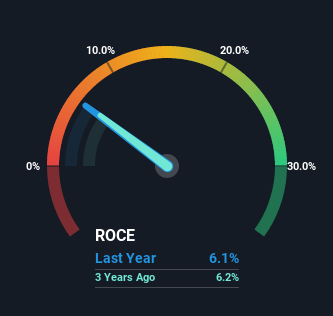- Greece
- /
- Basic Materials
- /
- ATSE:TITC
Investors Met With Slowing Returns on Capital At Titan Cement International (ATH:TITC)

Finding a business that has the potential to grow substantially is not easy, but it is possible if we look at a few key financial metrics. In a perfect world, we'd like to see a company investing more capital into its business and ideally the returns earned from that capital are also increasing. Put simply, these types of businesses are compounding machines, meaning they are continually reinvesting their earnings at ever-higher rates of return. Having said that, from a first glance at Titan Cement International (ATH:TITC) we aren't jumping out of our chairs at how returns are trending, but let's have a deeper look.
What is Return On Capital Employed (ROCE)?
For those who don't know, ROCE is a measure of a company's yearly pre-tax profit (its return), relative to the capital employed in the business. To calculate this metric for Titan Cement International, this is the formula:
Return on Capital Employed = Earnings Before Interest and Tax (EBIT) ÷ (Total Assets - Current Liabilities)
0.061 = €136m ÷ (€2.7b - €444m) (Based on the trailing twelve months to December 2021).
Thus, Titan Cement International has an ROCE of 6.1%. In absolute terms, that's a low return and it also under-performs the Basic Materials industry average of 9.8%.
View our latest analysis for Titan Cement International

Above you can see how the current ROCE for Titan Cement International compares to its prior returns on capital, but there's only so much you can tell from the past. If you're interested, you can view the analysts predictions in our free report on analyst forecasts for the company.
The Trend Of ROCE
There hasn't been much to report for Titan Cement International's returns and its level of capital employed because both metrics have been steady for the past five years. This tells us the company isn't reinvesting in itself, so it's plausible that it's past the growth phase. With that in mind, unless investment picks up again in the future, we wouldn't expect Titan Cement International to be a multi-bagger going forward. This probably explains why Titan Cement International is paying out 31% of its income to shareholders in the form of dividends. Unless businesses have highly compelling growth opportunities, they'll typically return some money to shareholders.
What We Can Learn From Titan Cement International's ROCE
In summary, Titan Cement International isn't compounding its earnings but is generating stable returns on the same amount of capital employed. And in the last five years, the stock has given away 36% so the market doesn't look too hopeful on these trends strengthening any time soon. In any case, the stock doesn't have these traits of a multi-bagger discussed above, so if that's what you're looking for, we think you'd have more luck elsewhere.
One more thing to note, we've identified 2 warning signs with Titan Cement International and understanding these should be part of your investment process.
While Titan Cement International isn't earning the highest return, check out this free list of companies that are earning high returns on equity with solid balance sheets.
Valuation is complex, but we're here to simplify it.
Discover if Titan Cement International might be undervalued or overvalued with our detailed analysis, featuring fair value estimates, potential risks, dividends, insider trades, and its financial condition.
Access Free AnalysisHave feedback on this article? Concerned about the content? Get in touch with us directly. Alternatively, email editorial-team (at) simplywallst.com.
This article by Simply Wall St is general in nature. We provide commentary based on historical data and analyst forecasts only using an unbiased methodology and our articles are not intended to be financial advice. It does not constitute a recommendation to buy or sell any stock, and does not take account of your objectives, or your financial situation. We aim to bring you long-term focused analysis driven by fundamental data. Note that our analysis may not factor in the latest price-sensitive company announcements or qualitative material. Simply Wall St has no position in any stocks mentioned.
About ATSE:TITC
Titan Cement International
Engages in the production, trade, and distribution of construction materials in Greece, the Balkans, Egypt, Türkiye, the United States, and Brazil.
Flawless balance sheet and undervalued.
Similar Companies
Market Insights
Community Narratives



